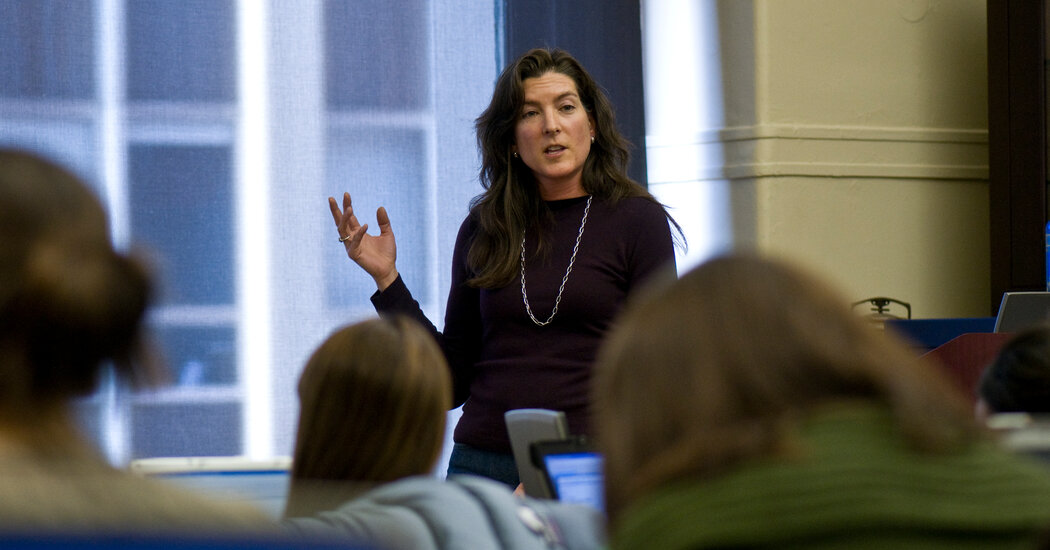She helped show government agencies around the world how to predict upcoming droughts, flooding and other extreme weather events.
Lisa Goddard, a climate scientist at Columbia University who harnessed cutting-edge computer models to bring invaluable data about upcoming floods, droughts and heat waves to people worldwide facing increasingly extreme weather events, died on Jan. 13 in Mount Kisco, N.Y. She was 55.
Her husband, David Cooperberg, said the cause was breast cancer.
At Columbia’s International Research Institute for Climate and Society, where she spent most of her career and which she ran from 2012 to 2020, Dr. Goddard specialized in honing predictive climate models for what scientists call subseasonal-to-seasonal forecasting — the temporal space between everyday weather and long-term climate.
To most people, she believed, such information was more important than the kind of far-off climate predictions that often make headlines.
“The types of hazards we worry most about with respect to climate change projections — such as droughts, heat waves, inundation events — are happening right now, and we can predict them with weeks to months of lead time, rather than merely projecting how their statistics may change in 50-100 years,” she said in a 2021 interview for the Columbia Climate School website.
Such an approach represented an abrupt shift from the way climate-prediction models were being used in the early 2000s, said John Furlow, who succeeded her as the director of the International Research Institute.
“A lot of the focus was on what’s going to happen at the end of the century, and what does that tell us about what we need to do now,” he said in an interview. “Lisa was a very loud and authoritative voice saying, ‘Look, people aren’t making decisions now for things that will be relevant at the end of the century.’”
Dr. Goddard joined the institute in 1995, and over the next 25 years she pioneered so-called climate services: She sought to understand a country’s unique needs, then developed tools tailored to them. For instance, she and her team created a drought-prediction tool for Jamaica that allows farmers and water providers to plan for looming shortages.
But making sure that people could use those tools was harder than it might seem. In many countries, weather and climate are handled by separate agencies, which often did not communicate with each other. And so, in addition to providing data, she established a series of training programs to show governments how to use that data effectively.
“She really went above and beyond to ensure that she provided sufficient expertise,” Jacqueline Spence-Hemmings, the head of the climate branch of Jamaica’s Meteorological Service, said in an interview.
Dr. Goddard became the institute’s director just after the National Oceanographic and Atmospheric Administration withdrew funding — a major blow to a center that relied heavily on government support.
With the institute facing low morale and an uncertain future, she rallied its staff and secured new and diversified funding. She then redoubled its outreach efforts, developing long-term relationships with groups like the U.S. Agency for International Development, the International Federation of Red Cross and Red Crescent Societies, and dozens of governments around the world.
“She was a visionary,” Maureen E. Raymo, the director of the Lamont-Doherty Earth Observatory at Columbia, said in an interview. “She took the I.R.I. and turned it into a powerhouse for providing climate services to the world.”
Lisa Marie Goddard was born on Sept. 23, 1966, in Sacramento, Calif. Her father, Glenn Goddard, worked for the state government, and her mother, Marie Betts, was a teacher.
Along with her husband, she is survived by her mother; her sister, Kristina Zimmerman; and her sons, Sam and Matthew.
She graduated from the University of California, Berkeley, with a degree in physics in 1988. Climate science was still in its infancy at the time, but public awareness of things like ozone depletion was growing, and she saw an opportunity to put her scientific training to practical use.
At Princeton, where she received a doctorate in atmospheric and oceanic sciences in 1995, she studied the effects of El Niño and La Niña, developing models that could predict how those alternating climatic events in the Pacific Ocean affected temperatures and rainfall in distant parts of the world.
She joined the International Research Institute’s West Coast branch, at the Scripps Institution of Oceanography in San Diego, in 1995, and transferred to its main office at Columbia in 2000.
So successful was her work there that in 2017, when Columbia’s president, Lee C. Bollinger, announced the Columbia World Projects, a series of interdisciplinary campaigns to bring the university’s research to bear on global problems, he chose the institute as a test case.
The program, Adapting Agriculture to Climate Today, for Tomorrow — known by the loose acronym ACToday — works with six countries in the developing world to prepare their food sectors for the impact of climate change.
“This was a really classic example of how to take science and actually think about how it will have practical implications,” Alex Halliday, the director of Columbia’s Earth Institute, which oversees the International Research Institute, said in an interview.
Dr. Goddard was acutely aware of her status as a woman in atmospheric sciences, a field where even today fewer than 20 percent of academic scholars are female. But, she said, she found a way to make that status work for her.
“There was an advantage to being a rarity: I found that if I asserted myself, and reached out to my professors and other scientists, I was more memorable than my average male colleagues because I was different,” she said in 2013. “So I really embraced that difference.”































